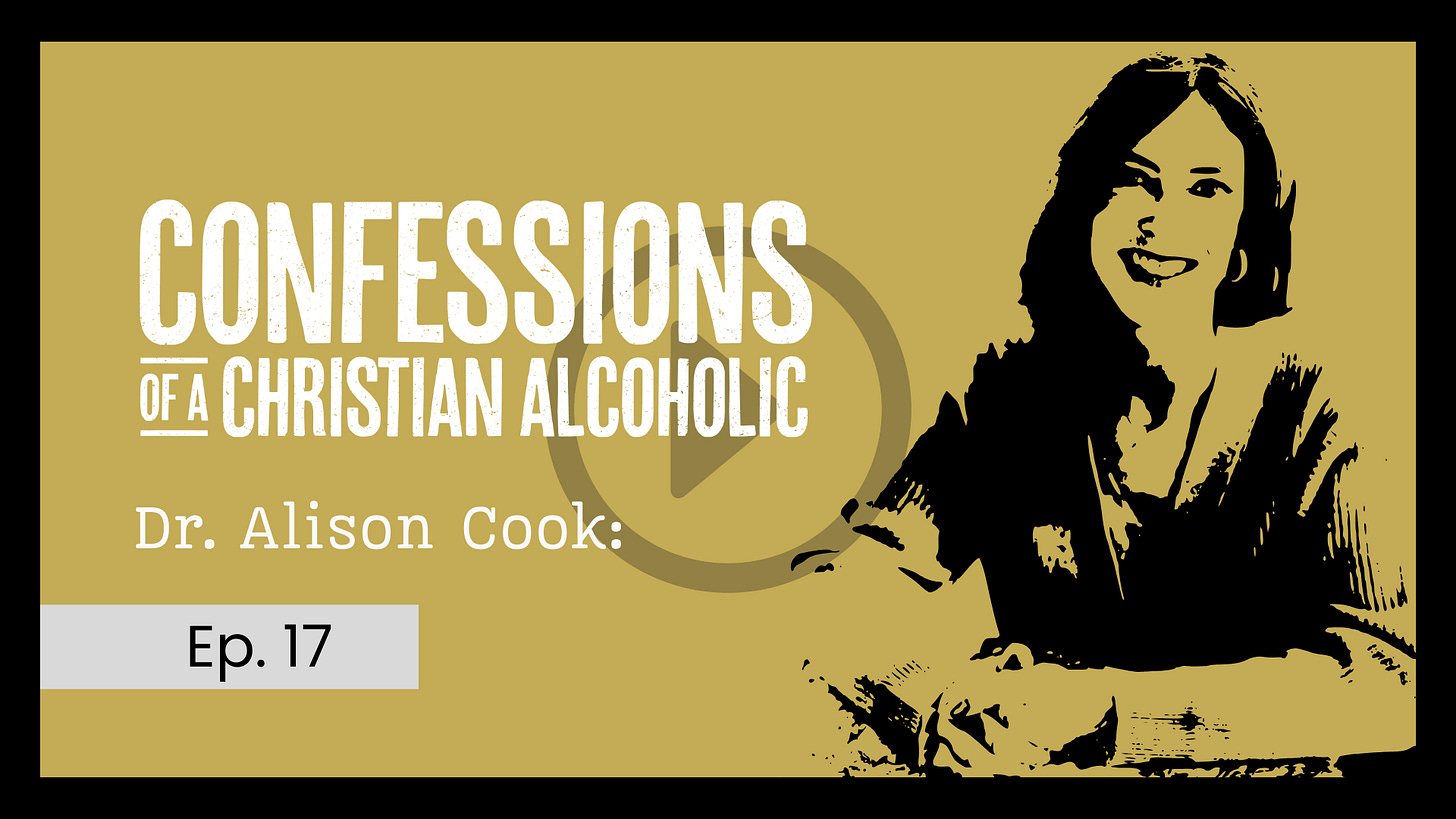Why you do what you don't want to do.
“Cognitive dissonance isn’t the problem. Rationalizing it is.”
“There’s a part of you that drinks and a part of you that doesn’t—and that doesn’t make you crazy. That makes you human.”
What happens when your faith says one thing and your actions say another? And what do you do when the coping mechanisms that once helped you survive start controlling you? That’s where today’s conversation lives—right in the messy space where faith and psychology meet, and it answers the question, "Why do I do the things I don't want to do?"
Dr. Alison Cook is a Christian therapist and the author of two incredible books that were monumental in my own addiction recovery: Boundaries for Your Soul and I Shouldn’t Feel This Way.
In this episode of "Confessions," Alison talks about how parts of ourselves can be both hurting and helping, how to hold compassion without coddling, cognitive dissonance, and why curiosity—not shame—is what truly leads to transformation. We also explore spiritual bypassing, the New Testament idea of sozo (salvation/healing), and how Internal Family Systems (IFS) helps us make sense of the parts of us that manage, protect, and sometimes reach for the “firehose” when pain flares up.
If you’ve ever been disgusted by your own actions, but are ready to stop beating yourself up, you'll want to listen.
We explore:
—Why Christians often experience cognitive dissonance but don’t know how to name it
—What Internal Family Systems (IFS) is and how it helps you understand yourself
—How to tell the difference between healthy coping and numbing
—The concept of “firefighters,” “managers,” and “exiles” inside your internal system
—Why spiritual bypassing is so common in the church
—How trauma gets buried and drives our behavior
—What Scripture really means by “salvation” (sozo)
—The link between addiction and unprocessed pain
—Why medication can be a gift of common grace
—How Jacob’s limp and new name point to a holy, healed identity
Apple:
Spotify:
About this week's guest: Dr. Alison Cook
Dr. Alison Cook is a licensed therapist, author, and podcast host whose work helps individuals develop strong emotional and spiritual health by learning about the “parts” of themselves. She holds degrees from Dartmouth and the University of Denver, and has over two decades of experience integrating faith and psychology. She’s the author of Boundaries for Your Soul and I Shouldn’t Feel This Way, and hosts The Best of You podcast.
Resources and links
Books: Boundaries for Your Soul and I Shouldn’t Feel This Way
Website: dralisoncook.com
Instagram: @dralisoncook
Podcast: The Best of You
Follow Jon: @jonseidl
Order the new book, Confessions of a Christian Alcoholic: www.christianalcoholic.com.
Be a guest on the show
Key moments
1:00 – Why Jon sees Dr. Cook’s work as foundational to his own recovery
6:00 – Alison explains the mission behind her books and podcast
9:00 – Naming without shame: what it is and why it’s essential
10:00 – Defining cognitive dissonance through music and mismatched notes
13:00 – Healthy coping vs. numbing; when strategies stop working
17:00 – The importance of pacing and not facing everything all at once
20:00 – How Christians spiritualize pain through “bypass” language
23:00 – Sozo: salvation as healing and ongoing restoration
25:00 – How medication fits into spiritual healing
27:00 – Redefining sin as “missing the mark”
30:00 – IFS explained: exiles, firefighters, and manager parts
36:00 – Why shame never helps—but curiosity does
43:00 – Leading yourself from a Spirit-led center instead of your trauma
49:00 – Jacob’s limp: what it means to walk away changed but not ashamed
55:00 – Final thoughts and where to find Dr. Cook’s work
Quotes
“There’s a part of you that drinks and a part of you that doesn’t—and that doesn’t make you crazy. That makes you human.”
“Cognitive dissonance isn’t the problem. Rationalizing it is.”
“Shame never helps. Shame never helps.”
“The firefighter comes in to put out the flames of pain. That’s where the wine comes in.”
“The addicted part of you is not all of you.”
“You don’t have to face everything all at once.”
“Jesus never told us to ignore our sadness. He wept.”
Video
Watch the video version of this episode, which removes all ads:
P.S. I use affiliate links at times to help support my writing.




It's the subconscious, that's why we don't do what we say we want and vice versa. Subconscious toxic coding happens in childhood with abuse and also following adult trauma. Also, IFS is transformative! Highly recommend Robert Falconer as one of the best in this field as he also integrates faith + IFS together, see his "The Others Within Us: Internal Family Systems, Porous Mind, and Spirit Possession"